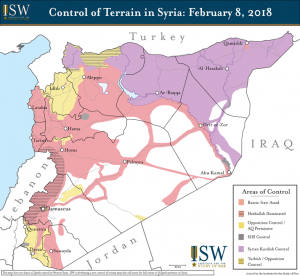 By: Matti Suomenaro and the ISW Syria Team
By: Matti Suomenaro and the ISW Syria Team
Key Takeaway: America’s adversaries in Syria are using military force to undermine U.S. forces and their partners. The Russian and Iranian military coalition backing Syrian President Bashar al-Assad coordinated a major attack against the U.S.-led Anti-ISIS Coalition in Eastern Syria. The U.S. responded tactically by striking its attackers in self defense, stopping the offensive. But this tactical success demonstrates that U.S. strategy in Syria is failing. Russia and Iran seek ways to capitalize on U.S. failures and act to constrain, disrupt, and ultimately expel the U.S. from Syria and the Middle East. Turkey, meanwhile, has invaded Syria to challenge Kurdish forces, some of which the U.S. backs. The U.S. risks losing the gains it has made fighting ISIS to Russia and Iran.
Russia and Iran intentionally attacked U.S. and partnered forces in Eastern Syria. Several hundred pro-Syrian regime fighters launched a “coordinated attack” against the Syrian Democratic Forces (SDF) – the main U.S. pattern in Syria – in Eastern Deir ez-Zour province on February 7. The U.S. has long had its own military personnel in the base. The U.S. responded with successful force protection strikes.
Russia, Iran, and the Syrian regime planned the operation in advance. They began preparing the attack weeks in advance and aimed to increase Iranian presence east of the Euphrates River in order to seize valuable oil and gas fields. Russia and Iran have for months sought to reintegrate by force critical areas in Eastern Syria held by the SDF – including Ar-Raqqa City as well as key oil and natural gas fields in Eastern Syria – back into the Assad regime. The oil and gas fields are critical for stabilizing the Syrian economy and the Assad regime. They also provide a source of revenue for these Russian and Iranian efforts.
Russia used proxy partners and official messaging to obfuscate its involvement, using a hybrid warfare technique common in Ukraine. Russian private military contractors and Lebanese Hezbollah participated in the attack. Russian officers maintained continuous communication with U.S. military officials through the deconfliction hotline during the attack in order to obfuscate Russia’s direct role in the incident. Russia both supported the attack and simultaneously gave the impression of genuine efforts to prevent the attack in order to confuse senior U.S. decision makers.
Read the full version of this summary update on ISW’s blog.
ISW’s Previous Assessments of the Russo-Iranian Coalition in Eastern Syria:
Escalation in Eastern Syria, ISW Senior Analyst Christopher Kozak, September 27, 2017
- The Russo-Iranian Coalition’s and U.S. Anti-ISIS Coalition’s “conflicting and overlapping objectives cannot be overcome through deconfliction but rather stand to drive future direct confrontation…along the Euphrates River Valley.”
- “The Russo-Iranian Coalition will likely intensify its efforts to constrain and block the U.S. Anti-ISIS Coalition in Eastern Syria. Pro-regime forces will likely launch new cross-river operations to deny key oil fields and population centers to the SDF along the Euphrates River Valley.”
Intelligence Estimate and Forecast: The Syrian Theater, ISW-CTP, September 23, 2017
- Pro-regime forces’ “intent is likely to block the U.S. if possible but to set conditions for the Syrian regime return to the province after the defeat of ISIS…The pro-regime coalition’s short-term tactical goals are to continue to reclaim ISIS-held oil and gas infrastructure in southeastern Syria and to expand the regime’s outreach to anti-ISIS tribes.”
- “Russia and Iran enable pro-regime forces to conduct offensive operations to seize key oil fields from ISIS in Deir ez Zour Province…Russia and Iran position themselves to contest American operations if necessary.”
- “Iran will continue supporting operations to bolster the presence of pro-regime forces in Deir ez Zour Province in Eastern Syria.”
- http://iswresearch.blogspot.gr/2018/02/us-strategy-in-syria-is-failing.html?utm_source=US+Strategy+in+Syria+is+Failing+-+Matti&utm_campaign=Eastern+Syria+-+US+Strategy+is+Failing&utm_medium=email



